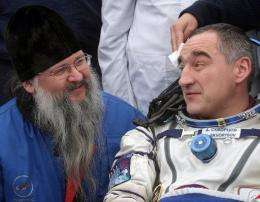Soyuz crew admit to disappointment at delayed landing

Russian cosmonaut Alexander Skvortsov admitted Monday to disappointment when he and his two crew had to return to the International Space Station after their Soyuz spaecraft failed to undock.
After 175 days in orbit, the unprecedented problems delayed for a day the return to Earth of Skvortsov, fellow-cosmonaut Mikhail Kornienko and US astronaut Tracy Caldwell.
"Until the very last, we hoped to find a way out of the situation," mission commander Skvortsov told reporters after finally returning to the space flight centre at Star City near Moscow.
He admitted to frustration and fatigue when cosmonaut Fyodor Yurchikhin, remaining aboard the space station, saw the latches locking the Soyuz to the ISS refuse to open and later discovered a loose gear piece near the hatch.
"Of course I was disappointed... when Fyodor saw the technical malfunction from the outside and we understood 'that's it', we would have to go back to the station, start from scratch. It's not easy," he was quoted by the RIA Novosti news agency as saying.
The weary crew succeeded in a second undocking attempt 24 hours later, landing safely Saturday exactly on time and at the appointed location in the central Kazakh steppes.
"Our happiness was unbounded when the flight control centre congratulated us and we understood that we had succeeded," Skvortsov said.
"There was a great deal of stress before the landing, but it was positive and full of emotions."
The undocking jam -- the first in a decade of Soyuz flights -- had left the six ISS members frantically troubleshooting ahead of the new launch time over additional fears the capsule was not fully airlocked due to a computer bug.
But the rare setback in a space programme that usually strives for and achieves pinpoint accuracy also followed two failures docking unmanned Russian Progress shuttles to the space station in recent months.
The mishaps could raise doubts about the reliability of the Russian craft as NASA mothballs its shuttle fleet later this year, leaving the ISS entirely dependent on Russia for flights to the station.
(c) 2010 AFP





















